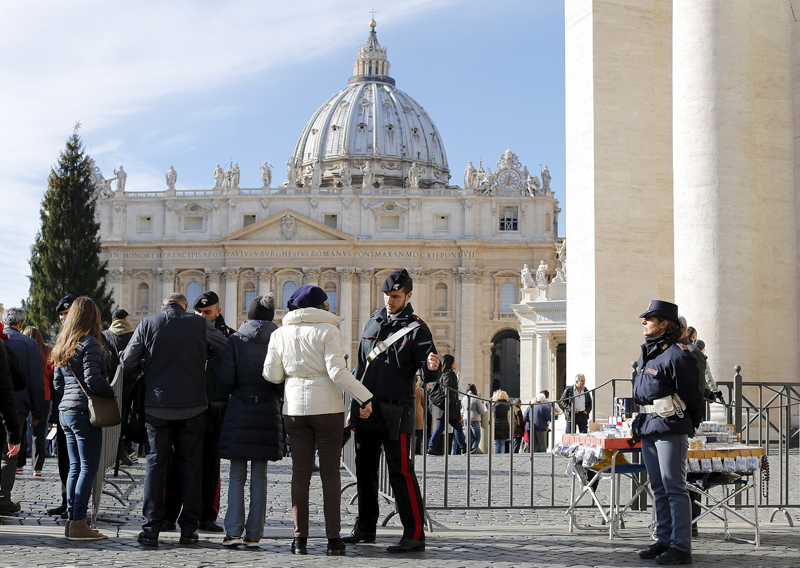
Italian Carabinieri officers check a person before Pope Francis’ Sunday Angelus prayer in St.Peter’s Square at the Vatican on Nov. 22, 2015. Photo courtesy of REUTERS/Alessandro Bianchi
*Editors: This photo may only be republished wth RNS-VATICAN-TRIAL, originally transmitted on Nov. 23, 2015.
VATICAN CITY (RNS) A trial due to open at the Vatican this week is drawing widespread condemnation as an attack on press freedom, as two journalists risk lengthy jail sentences for publishing leaked documents.
“It is one thing for the Vatican to try to protect itself from this scandal. But penalizing its exposure by journalists whose only sin was to do some investigative reporting cannot be tolerated,” said Alexandra Geneste, head of Reporters Without Borders’ EU-Balkans office, in a statement.
The doors of the Vatican’s criminal court will open on Tuesday (Nov. 24) for the start of an unprecedented trial that will be a significant test for the Holy See’s justice system. The case centers on documents allegedly stolen from the Vatican, in addition to other information that was illicitly shared with outsiders.
READ: Vatican to try five, including reporters, over leaks scandal
The Holy See secrets were laid bare in two books released earlier this month: “Merchants in the Temple” by Gianluigi Nuzzi and “Avarice” by Emiliano Fittipaldi. They explore Pope Francis’ struggle to reform the murky Vatican finances. They depict a Vatican plagued by mismanagement, greed and corruption, where Francis faces stiff resistance to his reform agenda.
Facing criminal charges alongside the two Italian journalists are the insiders accused of leaking the documents: Spanish priest Angel Lucio Vallejo Balda, his assistant Nicola Maio and Italian laywoman Francesca Chaouqui.
Both Vallejo Balda and Chaouqui were members of a papal commission established in 2013 to advise Francis on how to reform the Vatican administration. They were arrested just days ahead of the books’ publication. Chaouqui was released ahead of the trial after agreeing to cooperate with investigators, but Vallejo Balda has been held in custody.
As a city-state, the Vatican operates its own legal system and has jurisdiction over crimes committed on its territory, such as the theft of the documents, whether those accused are Vatican residents or not. While much of the Holy See’s legal system is based on the Italian system, the upcoming trial is based on a law introduced under Francis specifically to prevent leaks.
While the arrest of Vallejo Balda and Chaouqui sparked international interest, it is the charges made against Nuzzi and Fittipaldi that have prompted strong criticism.
Reporters Without Borders said the Vatican law being applied amounted to censorship. “There is a word for this kind of draconian law, the kind typically used by authoritarian regimes, and the word is ‘censorship,'” Geneste said.
Fittipaldi said he had been informed that the charges against him and his colleague carry a prison sentence of up to eight years.
The trial date was announced just three days in advance, which Nuzzi said was not nearly enough time to prepare. He called on the Holy See to investigate those whose dodgy dealings were detailed in his book, rather than bringing charges against journalists who reported them.
“I’m furious, but I’m convinced that I’ve done my job and fulfilled my obligation,” he told Religion News Service.
Nuzzi’s view has been backed by the Italian “Noi Siamo Chiesa” (“We Are Church”) movement of pro-reform Catholics, which on Monday called on Francis to focus on those in the Vatican administration responsible for wrongdoing.
Prosecuting journalists “seems to be a system all too convenient and entirely unacceptable,” said Vittorio Bellavite, the group’s national secretary.
The case against Nuzzi and Fittipaldi has also been criticized by the Organization for Security and Co-operation in Europe, which on Monday called on the Vatican to withdraw the charges against the two journalists.
“Journalists must be free to report on issues of public interests and to protect their confidential sources,” said Dunja Mijatovic, the OSCE’s media freedom representative.
Despite the charges weighing against the two journalists, they may well escape jail time even if found guilty by the Vatican court. They would have to be extradited from Italy to Holy See territory within the Vatican walls, a move that would face strong opposition on press freedom grounds.
LM/MG END SCAMMELL




